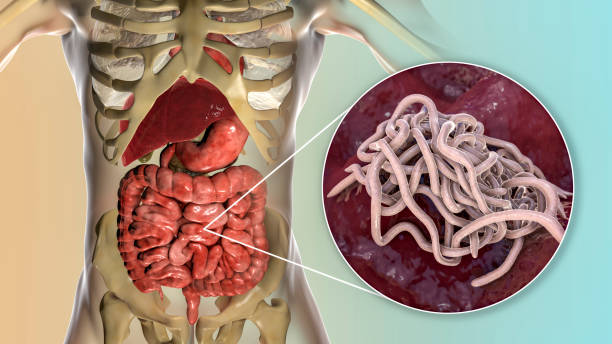


Parasitic infections, though often overlooked, pose a significant threat to global health. These infections are caused by various parasites that can invade the human body, leading to a range of symptoms and complications. Take Ivermectin 6 mg Tablet to treat to treat parasitic infections. In this article, we will delve into the causes, symptoms, and treatment options for parasitic infections, shedding light on this important yet often misunderstood topic.
Parasites are organisms that live on or inside another organism (the host) and benefit at the host’s expense. They can be categorized into different types based on their mode of transmission and the part of the body they affect. Some common types of parasites include protozoa, helminths (worms), and ectoparasites. Ivermectin Buy Online to cure to cure parasitic infections.
Protozoa: These are single-celled organisms that can cause diseases such as malaria, amoebiasis, giardiasis, and toxoplasmosis. Protozoan parasites are often transmitted through contaminated food or water, insect bites (as in the case of malaria), or direct contact with infected individuals.
Helminths: Helminths are multicellular worms that include flatworms (such as tapeworms and flukes) and roundworms (such as hookworms and pinworms). These parasites can enter the body through ingestion of contaminated food or water, penetration of the skin (as with hookworms), or by being transmitted through insect vectors.
Ectoparasites: Unlike protozoa and helminths, ectoparasites live on the outer surface of the host’s body. Examples include lice, fleas, ticks, and mites. These parasites typically cause skin irritation and can transmit diseases such as Lyme disease (tick-borne) and typhus (flea-borne).
The symptoms of parasitic infections can vary widely depending on the type of parasite involved, the part of the body affected, and the individual’s overall health. However, some common symptoms may indicate a parasitic infection:
Gastrointestinal Symptoms: These include diarrhea, abdominal pain, bloating, nausea, and vomiting. Gastrointestinal parasites like Giardia and Cryptosporidium often cause these symptoms.
Fatigue and Weakness: Many parasitic infections can lead to fatigue, weakness, and general malaise. This is often due to the parasite’s drain on the body’s nutrients and energy reserves.
Skin Problems: Ectoparasites like lice, scabies mites, and ticks can cause skin irritation, itching, rashes, and sometimes secondary infections.
Respiratory Issues: Certain parasitic infections, such as those caused by lung flukes or roundworms, can lead to respiratory symptoms like coughing, wheezing, and difficulty breathing.
Weight Loss: Severe parasitic infections, particularly those affecting the gastrointestinal tract, can lead to weight loss and malnutrition.
Fever: Infections caused by some parasites, such as malaria (transmitted by the Anopheles mosquito), can lead to recurrent episodes of fever.
Diagnosing parasitic infections often involves a combination of clinical symptoms, laboratory tests, and sometimes imaging studies. For example, stool samples may be examined for the presence of parasitic eggs or larvae in cases of gastrointestinal infections. Blood tests can help detect antibodies against certain parasites, indicating an active infection.
Treatment for parasitic infections depends on the type of parasite involved and the severity of the infection. Common treatment approaches include:
Antiparasitic Medications: These medications are designed to kill or inhibit the growth of parasites. Examples include antimalarial drugs (like chloroquine and artemisinin derivatives) for malaria, antihelminthic drugs (such as albendazole and mebendazole) for worm infections, and antimicrobial drugs (metronidazole, tinidazole) for protozoal infections.
Supportive Care: In addition to antiparasitic medications, supportive care may be necessary to manage symptoms such as diarrhea, dehydration, and nutritional deficiencies. This may include oral rehydration solutions, dietary supplements, and rest.
Preventive Measures: Preventing parasitic infections involves practicing good hygiene, avoiding contaminated food and water sources, using insect repellents, wearing protective clothing in endemic areas, and seeking medical advice before traveling to regions with a high risk of parasitic diseases.
Vector Control: Controlling the vectors that transmit parasitic infections, such as mosquitoes, ticks, and fleas, is crucial in preventing the spread of these diseases. This can be achieved through insecticide-treated bed nets, environmental sanitation, and public health interventions.
Parasitic infections remain a significant global health challenge, particularly in developing countries with poor sanitation and limited access to healthcare. Diseases like malaria, schistosomiasis, and soil-transmitted helminthiasis disproportionately affect vulnerable populations, including children and pregnant women.
One of the major challenges in combating parasitic infections is the emergence of drug resistance. Parasites can develop resistance to antiparasitic medications, making treatment less effective and complicating control efforts. Additionally, socioeconomic factors, climate change, and environmental degradation can influence the prevalence and distribution of parasitic diseases.
Parasitic infections are a complex and multifaceted health issue that requires a comprehensive approach involving prevention, diagnosis, and treatment. By understanding the causes, symptoms, and treatment options for these infections, healthcare professionals and individuals can work together to reduce the burden of parasitic diseases and improve global health outcomes. Efforts to promote hygiene, access to clean water, vector control, and research into new antiparasitic therapies are crucial in addressing this persistent public health challenge.